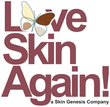
“What the acne sufferer needs to know about oleic and linoleic acids!”
“What the acne sufferer needs to know about oleic and linoleic acids!”
Wow! Does this ever sound like a complicated topic, but the bottom line is you have outbreaks on your face and maybe your body as well. What is important for you to understand is what makes your acne prone skin better or worse. It is always better to find out the cause and treat that for example nutritional or hormonal imbalances.
How does Oleic and Linoleic Acids impact Acne?
Oleic Acid: think olive oil, omega 9, and like the oils that the acne prone person produces. Oleic acids are heavier (greasier) and great for people who need hydrating and anti-inflammatory properties; however, if you don’t need them, then the results are clogged pores and oily acne-prone skin.
Oils with a higher concentration of oleic acid are: Avocado, macadamia, olive, hazelnut, apricot, shea nut and more.
If you are acne prone it is to your advantage to choose an oil that has a higher percentage of linoleic acid for your skin care needs, such as:
- Hemp Seed Oil
- Argan Oil
- Shea Butter
- Sunflower Seed Oil
- Neem Oil.
- Jojoba Oil
- Pumpkin Seed Oil
- Evening Primrose Oil
- Rose Hips Oil
- Grapeseed Oil
- Sunflower Oil
Results of increased oleic acids is thick, sticky sebum that can clog pores and cause skin to break out. Boosting your linoleic acid levels may help regulate your sebum production, ultimately minimizing your breakouts. Vitamin A may amplify these benefits.
Oleic acid is a fatty acid that occurs naturally in various animal and vegetable fats and oils. Linoleic acid, known as omega-6, is not produced in our body's tissue like oleic acid. However, it is of equally importance. Linoleic acid helps makes the skin's barrier stronger so it can effectively keep water in and irritants out. Topical use of linoleic acid helps reduce acne breakouts. Plant oils used in skincare that are rich in linoleic acid include safflower, sunflower, rosehips and evening primrose helping the skin health as a fat that promotes healthy cellular activity.
Sebum of acne-prone skin is deficient in linoleic acid – a vital component of sebum that affects its quality. This deficiency increases the level of a pro-inflammatory molecule which clogs the pores Clogged pores set the perfect stage for acne development. Linoleic acid has anti-inflammatory and anti-bacterial properties, which also helps with acne. Applying plant-based oils high in linoleic acid helps correct linoleic acid deficiency, which greatly reduces chances of future acne breakouts. I hope you got some inspiration to include the right oils into your skincare routine! Try https://loveskinagain “Nightly Blessings” nighttime facial oil or request a custom blend.
“We do better when we know better!”
Dr. Betty
